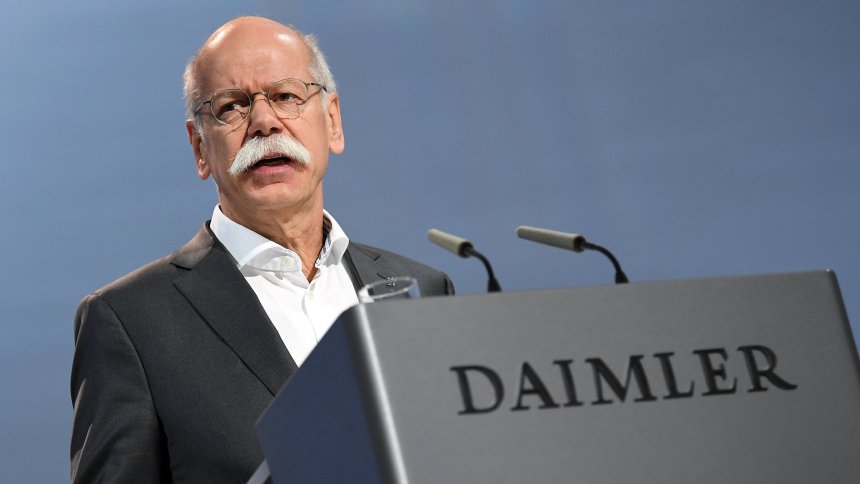The transformation of the car industry will cost Daimler a lot of energy. CEO Zetsche refuses at the Annual General Meeting because of the great cheers on the record numbers for 2017 – and prefers to point out the dangers.
Daimler CEO Dieter Zetsche
Thursday, 05.04.2018
16:14 clock
Even the recent record numbers at Daimler can not sell off the future concerns of many carmaker shareholders. Diesel scandal, cartel allegations, planned corporate restructuring and the challenges of electromobility – for hours, the Executive Board and the Supervisory Board had to answer shareholders’ questions at the Annual General Meeting on Thursday in Berlin as one of the long-running favorites of recent months.
The shareholders fear, among other things, high fines in connection with the diesel exhaust gas scandal and in the event that Daimler the future CO2 targets of the European Union for Mercedes-Benz vehicles can not be met.
The shareholders also had a lot of talking about the entry of the founder of the Chinese car giant Geely, Li Shufu, at Daimler. The billionaire had bought at the beginning of February, almost ten percent of the shares and had become the largest single shareholder in one fell swoop. However, several questions brought to light hardly new to the consequences of this entry. The answers from CEO Dieter Zetsche and Chief Financial Officer Bodo Uebber just repeated, as if memorized, the prepared language rules: Li is primarily to be regarded as a shareholder.
Criticism of shareholder protectors
There was also criticism of the mixed development of the share price. “There is a veil on automotive values and also on our Daimler AG,” said the Chief Executive of the German Association for Securities Holdings (DSW), Marc Tüngler. Fund manager Ingo Speich of Union Investment pointed to capital market concerns that given the best sales, sales and profits in the past year, things could not get any better and the years would be lean again.
Driven by growth in China in particular, Daimler had sold more vehicles than ever before in 2017 – which ultimately led to record figures on the balance sheet. With a turnover of 164.3 billion euros (plus seven percent) earned the Stuttgart before interest and taxes 14.7 billion euros – 14 percent more than in the previous year. The profit, which is attributable to the bottom line on the shareholders, the plus was even more pronounced. 10.5 billion euros represent an increase of 23 percent compared to the previous year.
But the mood currently requires restraint rather than too much self-praise. And so Zetsche already prepared the shareholders cautiously for the consequences of the massive investments in the electromobility could have on the balance of the coming years. “More electric cars are good for the carbon footprint, but not so good for our consolidated balance sheet – at least temporarily,” said Zetsche. The shift towards emission-free mobility was a business challenge.
Daimler wants to produce the first all-electric car of the brand EQ from 2019 on, nine more models are to follow. In addition, there will be an electrified version in every Mercedes segment until 2022.
In order to cope with the investments, Zetsche had already launched a new savings program in the Mercedes-Benz passenger car segment last September, which is expected to provide a margin of additional four billion euros over the coming years. Among other things, products should be brought to market faster, while the material and production costs of the Stuttgart want to become more efficient.
On Thursday, Zetsche again stressed the importance of diesel for lowering the carbon dioxideemissions. With modern internal combustion engines, the carbon dioxide emissions of road traffic could be reduced. “In particular, the diesel plays an important role,” said Zetsche. The diesel The latest generation is not the problem, but an important part of the solution.
Diesel is missing for the CO2 balance
Since then at Volkswagen 2015 the Scandal about exhaust gas manipulation came to light, however, diesel sales are declining more and more. The discussion about driving bans on diesel cars in some cities also scared consumers. However, the growing demand for gasoline brings the automakers in the dust, because they emit significantly more CO2 than diesel and Mercedes at the same time every year more heavy SUV (with higher consumption) sold. The result: The CO2 value of the entire fleet increased by another two to 125 grams last year. The target of 95 grams set by the EU for 2021 is thus far off.
Zetsche declined driving bans, however, and also demanded the hardware replenishment of diesel cars which Daimler had demanded: Daimler advocated “what is technically reasonable and financially responsible”. “For this, the announced software updates for over three million vehicles are an effective and relatively quick solution.”

